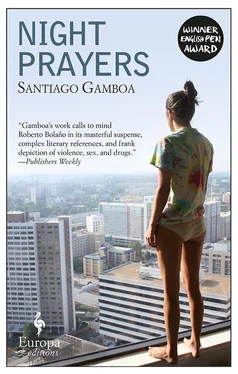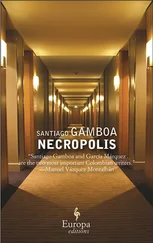“Welcome, sir, how can I help you?” said a young man with rotten teeth, with MP3 earbuds in his ears.
I looked at him for a moment without knowing what to say.
“I’d like to see the rooms, how much does a night cost?”
“Twenty-five dollars, wait, I’ll give you a key,” he said.
The smell of his decaying teeth knocked me out. I looked at the board where the keys were, 301 was free.
“I’d like 301.”
“Oh, that one? Very well, take it, sir. Don’t forget to hand it in before you go out. How many nights would that be?”
Already on my way to the elevator, I said, without looking at him: I’d like to see it first, then we’ll see.
It was the room where they had arrested Manuel Manrique. I didn’t think I’d find anything, I just wanted to take a look. Room 301 was the last room in a corridor that ended in a window, looking out on a rough, damp courtyard, with plants that clung to the wall and climbed the pipes.
I opened the door, thinking that the police must have recorded everything many times. I was greeted by the same damp smell as in the lobby, but more concentrated. The air conditioner started up, filling the space with the gas from its condenser. That happens with old machines. The bed was small but decent, and next to it was a wardrobe of laminated wood. The carpet seemed in a better state than the one on the stairs. The window was at the same level as a curved overpass. At night, the lights of the cars must filter in through the blinds.
I imagined Manuel sitting on that bed, the room receiving the intermittent flashing of the car lights projected on the wall. Maybe eating a chicken sandwich and a Diet Coke. The image of someone who wants something to happen, or who is protecting himself from something lying in wait for him. The smell of the room seemed to suggest: here he suffered in silence, in solitude. It struck me that in the middle of the night a place like that must have been populated by demons, at that cold hour when the birds call sadly to the sun. How long did Manuel spend here? I’d have to ask him. There were yellowish tiles on the bathroom floor. A mosquito was fluttering around the shower curtain, which was blackened and broken. I put my head in, but there was nothing. A mirror. The washbowl faucet was dripping.
I went back to the corridor, the elevator. I descended to the lobby. I handed back the key and went out on the street, realizing that I was sweating. It was an oppressive place, or maybe it was me, or the story. I walked to the intersection with an avenue, hailed a taxi, and went back to the hotel.
When I opened my e-mail, there was already a reply from Colombia: “Send budget to authorize funds. Write detailed report on the situation.”
I called the Mexican embassy to talk with the counselor there, Teresa Acosta. I’d been told she could help me, and sure enough, she gave me an appointment for that same afternoon.
The offices were in the Thai Way Tower, not very far from my hotel, an unusual granite and glass building in the business district, North Sathorn Road, the face of Asian capitalism, the most conspicuous, most strident face of modernity.
“We haven’t had any cases of prisoners,” Teresa said, “but I’ve known of many, especially Australians and Brits. The best option is for the defendant to plead guilty and beg the king for clemency. That’s what they’d interpret as a proper show of respect for their legal system. Diplomacy is important. Sometimes, you can arrange for the defendant to serve his sentence in his own country. The hard part is doing all that without having an embassy. I’ll be honest with you. They’ll listen, but they won’t pay you the same attention, because they aren’t obliged to.”
She gave me the telephone number of the lawyer. I called him from her office, and on Teresa’s recommendation, he agreed to see me the following day. In addition, Teresa offered to go with me, a gesture I greatly appreciated.
She was a friendly, attractive woman, who looked good for her age: about forty, or maybe slightly more. I liked her, she struck me as a generous person. I suggested we go down on the street and have a drink while I heard her advice on what to do. She accepted, and we went to a bar near her office.
She had been in Bangkok for three years, she was a career diplomat. The problems of her compatriots mostly revolved around robberies and the usual tricks played on tourists. Only once had there been a minor case involving possession of a small quantity of drugs, and it had resulted merely in provisional detention. That was how she knew the lawyer, who helped them with everything.
I told her Manuel’s story and she listened to me with a surprised expression.
“A young philosopher?” she said. “That’s the strangest thing I’ve ever heard! There have been cases of people accused of things in order to keep the police or even the press quiet and give breathing space to those who are really involved. It’s a delicate matter. You’ll have to handle it with kid gloves.”
We kept ordering gin and Cuba Libres until we felt pleasantly drunk and a tad hungry. She suggested we have dinner in a place typical of her neighborhood, Sukhumvit, which turned out to be a very lively area full of restaurants and bars, with tables out on the street and neon signs.
“Do you like fish?” she said as we sat down on the terrace of a place called Bo Lan. “Because if you do, you can try this, look.”
She pointed to the menu: red snapper in turmeric curry with coconut milk, a Renaissance dish that’s called geng guwa pla dtaeng in Thai. We ordered it, and as we drank our aperitifs I thought of the great Manuel Vázquez Montalbán, who died in the airport of this city as he was changing planes and who actually wrote a novel called The Birds of Bangkok . I mentioned it to Teresa.
“I know the book,” she said. “There’s an episode where Pepe Carvalho has dinner in a Chinese restaurant called the Shangri La, eats duck, and then goes to the Atami massage parlor, which if I’m not mistaken still exists. You can go there later, if you like. The women are supposed to be stunning.”
“It isn’t Vázquez Montalbán’s best novel,” I said. “There’s something very eighties Spain about it, the way it depicts Asia as a ridiculously exotic place. The characters talk like in Tintin: ‘Velly nice city, we visit?’”
The food was delicious, and we drank more alcohol, including the Mekong , a cocktail mentioned by Vázquez Montalbán (it was through reading him that I’d discovered the Singapore Sling and Lagavulin whisky). After the check, Teresa invited me to have one last drink on the terrace of her apartment.
“I’ll offer you a tour of Bangkok in one minute,” she said.
She lived on the top floor of a huge building, from which, sure enough, there was a 360-degree view of the city: the metallic purple lights of the skyscrapers, the black silhouette of the river, the congested roads in the distance, the luminous profile of a never-ending metropolis.
Her apartment was a pleasant deux pièces with antiques, designer objects, and an original José Luis Cuevas on the wall, Portrait of a Woman. We continued talking.
“My husband and I separated rather abruptly,” she said, “but there are people who get married at the point at which we parted. I loved him a lot. I still do.”
Her elder daughter was completing a doctorate in human rights and lived in Aguascalientes. The younger one was about to graduate in political science from the Sorbonne. She was a career civil servant but she liked literature and, of course, kept under lock and key a few poems of her own that she wouldn’t have shown anybody for anything in the world. She talked to me about Bonifaz Nuño, Octavio Paz, Gerardo Deniz. I told her I had read Gatuperio and she could hardly believe her eyes. “You know Deniz? You’re kidding! He’s hardly known outside Mexico!”
Читать дальше












